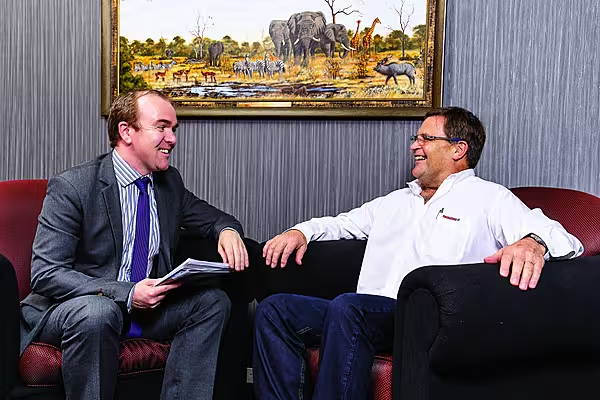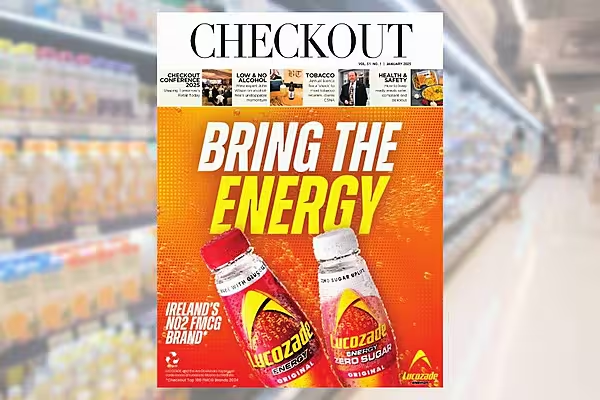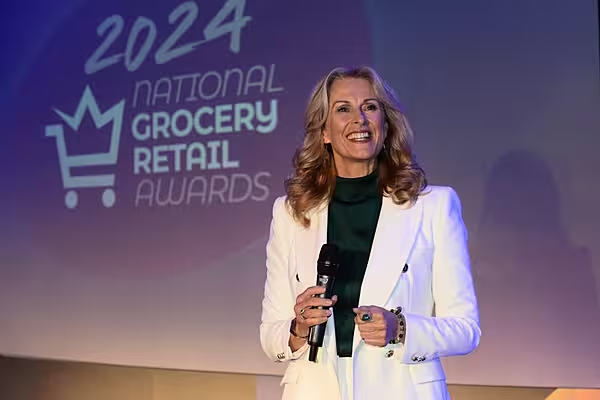Spar Group, which operates the Spar franchise in South Africa, surprised analysts last year, when it took a controlling stake in Dublin-based BWG Group, which operates the brand in Ireland. Stephen Wynne-Jones travelled to the group’s headquarters in Pinetown, South Africa, to discover what Graham O’Connor, chief executive, has in store for the business.
It’s just past 8.30 a.m. at the Spar Group headquarters in Pinetown, near Durban, and it’s already a balmy 25 degrees outside. Not bad, considering it’s just above freezing back home.
Checkout is here to meet Graham O’Connor, chief executive of the burgeoning retail group that operates the Spar brand in South Africa and an increasing number of neighbouring African countries. Last August, however, O’Connor and his team embarked upon their most audacious venture to date, acquiring 80-per-cent ownership of BWG Group, operators of the Spar franchise in Ireland, for €55 million (or 798 million rand, in local currency) – despite around 10,000 kilometres separating BWG’s Dublin headquarters and the spacious boardroom I’m sitting in now.
“When Leo [Crawford, BWG’s chief executive] first approached me,” O’Connor explains, “my first question to myself was, ‘Can I go to war with these people by my side?’ And the answer was undoubtedly yes.”
Shared Vision
South Africa is the second-biggest market for the Spar brand by turnover, with 1,886 stores across the country at year-end 2014. As it has grown in its native country, so has it looked to grow organically in other markets; launches in Botswana, Swaziland, Namibia and Nigeria (the latter of which is Africa’s largest economy) have proved successful, while the group has also “made progress” in Mozambique and Angola. However, its Zimbabwe operation has performed weaker than expected, with the group describing trading there as “challenging”. Prior to BWG’s approach in early 2014, Ireland was not on the company’s radar.
“We never said we would limit ourselves to Africa. If other opportunities arose, we would take a look at them,” says O’Connor. “Some years ago, I went to Thailand and Australia to look at potentially opening a franchise there, but neither panned out. In hindsight, we’re probably better off, given the economic challenges in both countries.”
Similarly, Ireland’s economic difficulties have been well documented. With regard to BWG, the business, while profitable year on year, was hamstrung by longstanding bank debt, accrued during the boom years.
In 2006, Crawford and fellow directors John Clohisey and John O’Donnell enacted a management buyout of the firm, borrowing heavily from the banks in order to fund the €390-million takeover from Electra Partners. As Crawford would later comment, this “accident of history” saddled the business with debt, not helped by plummeting values at its company-owned Triode Newhill property group. However, following a restructuring of this debt last year, BWG was looking for investors to bring the business forward. Enter O’Connor and his team.
“I met Leo at our Spar International board meeting in Abu Dhabi last March, and he asked me straight out, ‘Would you be interested in assisting with some funding for Spar in Ireland? On a bond basis, or equity basis?’ As I told him, if there was an opportunity to take a majority equity stake, we would certainly be interested. That’s how it started.”
O’Connor, who himself boasts Irish ancestry (from Tipperary), has previously described BWG Group’s management as “top-class individuals”, and thus the negotiation process was “not all that difficult. I’m a firm believer in the strength of relationships, doing business with people you can trust. We could see things were changing in Ireland, and the fact that BWG had been able to invest and grow the business in a tough environment gave us even more assurance.
“Of course, there were people telling us that we were making a big mistake, that the fact that the business was so much in debt was a sign that it must be poorly run. On the contrary – I mean, in this country, if there were a 10% fall in property prices, it would be a total train crash. Ireland experienced an 85% fall in property prices. That sort of thing is inconceivable. And yet, they kept going.”
O’Connor believes that based on current estimates, and the higher margins available in the Irish market, the BWG Group operation could account for as much as 30% of turnover in this calendar year. Analysts, too, have welcomed the move, with Michael Treherne of Vestact Asset Management telling this magazine last autumn that he saw it as a “good combination”, adding, “If the Irish economy picks up like Spar Group is hoping, the deal looks to have a good upside for the business.” Similarly, Richard Middleton of Investec Growth Fund described it as a “great acquisition” and a real “winner for Spar”.
Key Contributor
In fact, the Irish operation has already boosted Spar Group’s full-year performance, with the two month period following the announcement seeing the business contribute around R2.7 million worth of turnover and R65.5 million in profits to the group’s full year results, to 30 September (overall, the group saw its turnover rise 15%, to R54.5 billion, and profit after tax up 13.3%, to R1.35 billion).
“It’s a fairly chunky part of the business,” O’Connor says of the BWG operation. “It’s not just a little add-on business that we ‘by the way’ are getting involved in. Before we made the offer, we asked ourselves, ‘Can we grow this business?’ If we didn’t think we could grow it, we wouldn’t have gone anywhere near it.”
He likens the running of the BWG business to the current structure that the group operates in South Africa: a decentralised model with independent management structures managing its six regions. Ireland, despite its geographical distance, will simply become a seventh.
“People ask me, ‘Aren’t you going to put your own people in there?’ and I tell them that in due course, we will, and we will look to bring some Irish people into our operation, but we’ve seen what the current management has been able to do over the past few years, renegotiating with the banks and developing a vision of where the business needs to go. We are there to support them on that vision.”
Learning Curve
For Spar Group, the move offers O’Connor and his team the chance to better understand convenience retailing, with the Spar store portfolio fundamentally different in both countries. In South Africa, it operates the Kwikspar and SuperSpar franchises (comprising fairly sizeable independently owned supermarkets), as well as the Tops off-licence brand (now the number-one liquor-store brand in South Africa, having seen its sales rise 13.8% last year) and Build It, a building supply chain that saw sales rise 9.5% last year.
In Ireland, BWG’s predominantly independently owned portfolio is built around convenience brands under the banners Spar, Mace and other franchises, something that appears alien to O’Connor and his team. “In Ireland, you might see a Mace store right next door to a Spar outlet. That’s a bit foreign to us,” O’Connor explains, adding that while BWG is certainly a “leader in convenience”, perhaps more could be done to boost the performance of its Eurospar supermarket brand.
“We’re certainly in the throes of looking [at Eurospar] because it hasn’t been as successful as it should have been, in my eyes. I think we’re missing a trick there.”
Are there aspirations to expand the Eurospar business to compete more with mainstream supermarkets, as has been suggested in the Irish press? “That’s not our intention at all. With Eurospar, we see ourselves operating as a ‘convenience supermarket’, as opposed to going head to head with big-box retail. We’re not going to be going up against the likes of Tesco or Aldi or Lidl. It’s more about improving the fresh offer and giving the brand more of an identity. As far as the convenience elements of the business go, it’s been very successful, and we’re not going to change a winning formula.”
O’Connor also dismisses suggestions that Spar Group may look to rebrand elements of its Irish operation, bringing it into line with its brands in South Africa, for example, changing ‘Eurospar’ to ‘SuperSpar’.
“We had a discussion about that,” he explains, “but we felt there was enough equity in the Eurospar name to retain it. Plus, it’s a name with international recognition - although it wouldn’t work in South Africa. We’re not going to go around changing brand names. The good things we will build on, and the bad things we will cut out.”
UK Opportunity
What the BWG deal has also delivered for Spar Group is an in to the UK market. BWG operates the Appleby Westward retail group in the south-west of England, which, again, opens up opportunity for expansion.
“If I look at the standard of the stores in Ireland versus the UK, Ireland is probably about 50% better from a quality point of view, so there is room for improvement there,” says O’Connor. “Secondly, the competition that we have in the south-west of England is nowhere near the standard of our stores, so that would give me a lot of confidence that we would be able to grow the business.”
The group’s acquisition of the Appleby operation hasn’t gone unnoticed by Spar UK, based in Middlesex, which, while not directly in competition with BWG, still felt it necessary to summon O’Connor to a recent board meeting to uncover his plans.
“As I told them, ‘Look, we want to grow the business, and if acquisitions arrive, we’ll take a look at them. But first and foremost, we’re really focused on driving the business ahead in the south-west of England, and if you guys are on the bus with us, that’s great.’ If not, we’ll take it as it comes.”
Close To Home
The year 2015 has started well for Spar Group, with its first-quarter figures (for the 17-week period to 24 January) showing group sales up 38.3%. Group sales in South Africa increased by 8.7%, with sales in comparable stores growing by 8.1%.
Spar Group plans to open around 130 stores this year, including 35 Spar outlets, as well as renovate around 180 of its existing premises. Last year, it opened 19 Spar outlets (below its target of 23 openings, due to increased competition and labour challenges) and closed 17 underperforming stores.
Spar’s management is conscious of the challenges in the South African market, of course. In a presentation to accompany its full-year results late last year, management spoke of the “muted” South African economy, with “unrelenting unemployment, distressed household debt and higher interest rates” all impacting consumer spending. Widespread industrial action and ‘known unknowns’, such as load shedding (planned power outages), have also contributed to this challenging environment.
However, O’Connor is confident that this is only a minor blip in the group’s domestic growth plans. It opened 51 Tops off-licences last year, an indication of the momentum of this particular sector. A further 45 are scheduled for this year.
“We certainly see Tops as one of our core strengths,” he says. “Because of changes in legislation, we had to go down that road, and it’s been very successful for us. In terms of the Spar brand, we still consider ourselves to be the leaders in meats, in home bakery, and in deli.
“On the produce side, we’re certainly ahead of our major competitors, apart from, perhaps, Woolworths. Woolworths are top of the pile, and it’s up to us to close that gap.”
Instant Synergy
In spite of the distance separating the two businesses, there’s much in common between Spar Group and the BWG operation, in which it now has a controlling stake. When O’Connor says that the group’s “primary focus is on growing its independent retailers”, it’s a line taken straight out of Leo Crawford’s mission statement for the Irish business.
Just as BWG has sought to keep itself under the radar in terms of growth, so Spar Group has always been considered a low-profile company. “That’s a description that has long suited us,” says O’Connor, as the morning sun starts to penetrate the boardroom windows. “We used to operate in the long grass, so to speak, so no one could see us. As we’ve got bigger and bigger, that’s not possible any more, but we’re not going to start beating our chests about it.
“We’re a community-based business, and we want to succeed in the communities that we serve. That’s what it comes down to at the end of the day.”









